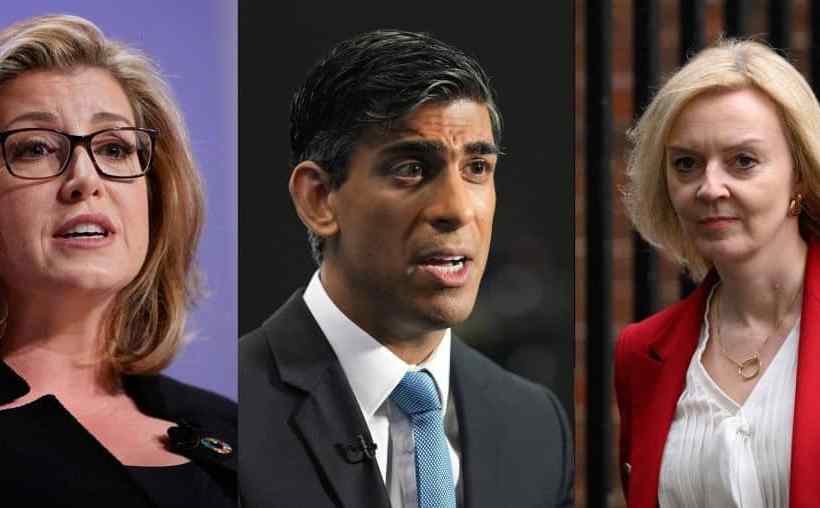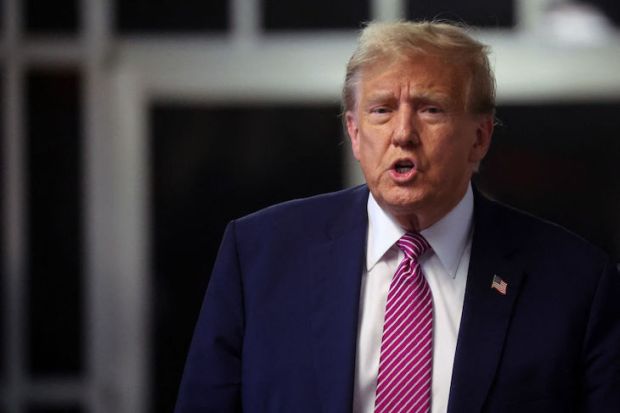Ask any Labour politician which of the Conservative leadership candidates they fear most and they will most likely say: none of them. That is largely hubris, because Penny Mordaunt, Rishi Sunak and Liz Truss, the likeliest candidates to become Britain’s next Prime Minister, pose different threats to Labour’s opinion poll lead.
Ideally, Labour would like Boris Johnson to remain caretaker Prime Minister for as long as possible – recent weeks have seen Labour’s polling rise and rise with the messy demise of the Prime Minister. When Keir Starmer said his party had an electoral mountain to climb after the 2019 election, he likely did not figure on Boris Johnson acting as his personal Sherpa Tenzing.
But once Boris is out, Labour would settle for a successor they can closely associate with his poisonous personal and policy legacy. That being the case, Sunak is their man. Not only was he Chancellor until just last week, he was also fined for breaking the Covid rules. Fairly or not, his wife’s non-dom tax status fatally reinforced the impression that, like the Prime Minister, Sunak was an elitist who avoided the rules ordinary Britons were forced to follow. It is no accident that this week Rachel Reeves has been highlighting Labour’s proposed abolition of the non-dom tax loophole.
Labour would, however, likely see Liz Truss as a good alternative to Sunak. While she has seemingly no vulnerable personal issues Truss did stay loyal to Johnson until the bitter end and is backed by Jacob Rees-Mogg and Nadine Dorries, leading members of Johnson’s paramilitary wing.
That leaves Penny Mordaunt, the candidate about whom Labour has most misgivings, for she is untainted in the public’s eye by association with the Johnson years. She could be the candidate that spikes Starmer’s guns, just as the then little-known John Major did when he replaced Margaret Thatcher in 1990, making it seem like the 11-year-old Conservative government had been reborn. As a result, Major immediately reversed his party’s poll deficit with Neil Kinnock’s Labour and within two years had won a famous election victory. Recently Starmer has been saying a Labour government would be a ‘fresh start’ for the country as it would end ‘12 years of Tory damage’: but what if Prime Minister Mordaunt persuades voters that she is that new beginning?
Survey evidence as to who might be best able to beat Labour confirms that analysis; but the evidence is more equivocal and ropey than the Mordaunt campaign cares to admit. If some polls suggest she is more popular than Sunak, her lead with the general public is paper thin and most people confess to knowing nothing about her. The fact she is unknown is clearly an advantage. But that means she is also a wild card. For who knows if a fickle public will continue to like her once she is in No. 10? That of course goes to some extent for all three candidates. Nobody can predict how they will perform in the uniquely high-pressure job of prime minister. Downing Street has turned into a graveyard for many apparently well-qualified hopefuls. Just ask Gordon Brown.
But whatever the relative merits of the three main candidates, Labour must be grateful for how the contest has gone so far. The Tory party has failed to address the pressing concerns of the public, notably the cost-of-living crisis and how the country might recover from the Covid years. Tax cuts have dominated the discourse as well as the ambition to cut back the state. All of the candidates agree on the merits of this, even if they disagree about the when and how. At a time when many Britons would probably be grateful for more not less government in their lives, that seems like an odd emphasis for a party losing by-elections for fun.
All the current crop of candidates agree that tax cuts and a small state are the defining characteristics of Conservatism. And yet not long ago – 2016 in fact – the party elected a leader in Theresa May who argued, ‘government can and should be a force for good’ especially in the service of those ‘just about managing’, ‘ordinary working class people’ who need it most. On that basis, even amidst her disastrous 2017 election campaign, Theresa May significantly advanced her party’s vote in the Red Wall seats Boris Johnson (and Brexit) would win two years later. Johnson’s subsequent rhetoric that these votes had been merely lent to him and that through Levelling Up his government would hope to retain them, along with May’s strategy, now appears to have been completely forgotten. And Conservatives are no longer faced by Jeremy Corbyn but by a determinedly patriotic Keir Starmer who has recently confirmed his party will now seek to make Brexit work.
Once they are clear of having to appeal to their own MPs and members, perhaps the winning candidate will shift their focus as PM. But so far, none of the candidates, including those mostly likely to end up winning, show any sign of doing more than pandering to their party’s prejudices, something for which Labour must be very grateful.
Got something to add? Join the discussion and comment below.
Get 10 issues for just $10
Subscribe to The Spectator Australia today for the next 10 magazine issues, plus full online access, for just $10.




















Comments
Don't miss out
Join the conversation with other Spectator Australia readers. Subscribe to leave a comment.
SUBSCRIBEAlready a subscriber? Log in